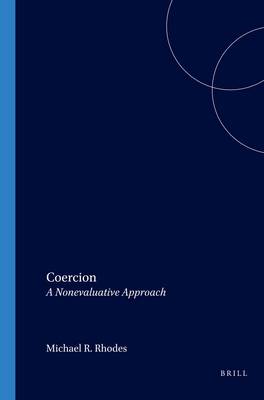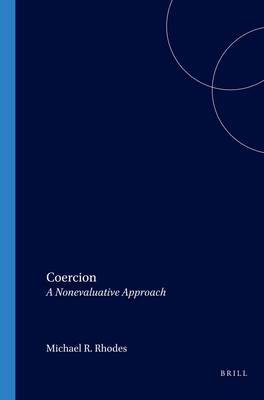
- Afhalen na 1 uur in een winkel met voorraad
- Gratis thuislevering in België vanaf € 30
- Ruim aanbod met 7 miljoen producten
- Afhalen na 1 uur in een winkel met voorraad
- Gratis thuislevering in België vanaf € 30
- Ruim aanbod met 7 miljoen producten
Zoeken
Omschrijving
In this book, Rhodes provides a nonevaluative account of coercion. He begins with a thorough discussion of the charge that coercion is an essentially contested concept. He argues that effective communication of regulations pertaining to human conduct requires a basic level of clarity as to the kind of conduct being regulated. Accordingly, he argues that before we prescribe or proscribe conduct, we should describe it. In short, he maintains that wherever possible description should precede prescription and proscription. Rhodes begins his descriptive project by providing a fundamental account of human motivation. Upon this foundation he supports his distinctions between threats, offers, throffers, and neutral proposals. He argues that all coercion claims can be understood in light of these components. He applies this analysis to three prominent accounts of coercion as advanced by F.A. Hayek, Harry Frankfurt, and Robert Nozick. After comparing and contrasting these views, Rhodes provides his own account. Rhodes's account is based upon the identification of what he refers to as perceived-threat-avoidance-behavior as a necessary condition for coercion. As a descriptive, or nonevaluative, account, Rhodes is able to identify coercion independent from normative judgments. He argues that it is not the wrongfulness of some conduct that makes it coercion, instead, it is the coerciveness of some conduct that makes it wrong. Unique to Rhodes's account, coercion is not necessarily wrong. As a descriptive account, his view permits an independent analysis of the moral status of an act of coercion. The book concludes with a discussion of the normatively significant variables of a coercion claim.
Specificaties
Betrokkenen
- Auteur(s):
- Uitgeverij:
Inhoud
- Aantal bladzijden:
- 204
- Taal:
- Engels
- Reeks:
- Reeksnummer:
- nr. 92
Eigenschappen
- Productcode (EAN):
- 9789042007895
- Verschijningsdatum:
- 1/01/2000
- Uitvoering:
- Paperback
- Formaat:
- Trade paperback (VS)
- Afmetingen:
- 155 mm x 234 mm
- Gewicht:
- 303 g

Alleen bij Standaard Boekhandel
+ 161 punten op je klantenkaart van Standaard Boekhandel
Beoordelingen
We publiceren alleen reviews die voldoen aan de voorwaarden voor reviews. Bekijk onze voorwaarden voor reviews.








